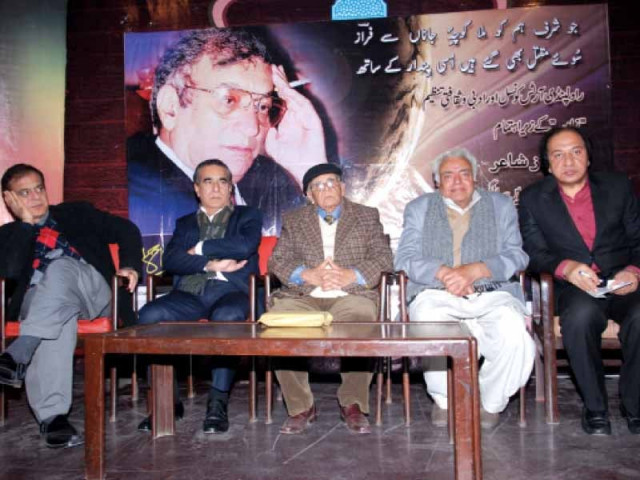Peoples’ poet: Sons are still named after Faraz
Lovers dot on his mundane couplets as fondly as political activists take fire from resistance-ringing poems.

Faraz’s sons Saadi and Shibli were the chief guests at the poetry recital at the Rawalpindi Art Council. PHOTO: EXPRESS
To paraphrase someone, poetry should come as naturally as leaves to trees or it better not come at all. Put this to Ahmad Faraz, and he will not disappoint you.
Love and resistance rendered in simple words, such was the craft of the late poet Ahmad Faraz. As the poet penned book-after-book, nimbly straddling between the two subjects, his admirers across age and class responded in equal measure.
In any given setting, you will find one or two named after the poet --- a rare tribute that arguably, no other poet could rival.
Also, when one discusses a poet like Faraz, the discussion must turn in tandem to the man and his craft. In his case, one cannot really disentangle one aspect from the other, for they are so intricately interwoven in his poetry.
This echoed in a hall at the Rawalpindi Arts Council (RAC), where a poetry recital was organised by the council in collaboration with a literary society, Zawiya, on the eve of 83rd birth anniversary of the poet.
Mehboob Zafar, a close friend of the poet who anchored the recital, said Faraz treated the age-old theme of love as it attracted the young and the old alike.

According to Zafar, he was arguably the only poet who not only wrote against the dictatorial regimes but practically lead movements on the streets. His epic poem “Mohaasra”, which became a literal anthem for freedom and democracy-loving people, was reportedly the cause of his arrest and later self-imposed exile from the country.
Recalling the lawyers’ movement in 2007, Zafar said that “he was deeply interested in it and would often come out before everyone else to take us to the procession venue.”
The legendary poet was born on January 14, 1931 in Kohat and lived to be 78. Some of his famous books are “Janan Janan,” “Tanha Tnaha”, “Dard Ashub”, “Sher I Gul Preshan Hai,” and “Shabkoon.” Numerous couplets that he penned have become proverbs.
Zafar concurred with the commonly held perception that Faraz’s passing has left a void in Urdu poetry, saying that much as in every other sphere of life where a downward trend is being witnessed, the same is true of poetry. In the same breath, he added, “Faraz always encouraged the young voices and for the same reasons we have invited today over 70 poets from the surroundings of the twin cities. The need is to emulate the life and craft of poets like Faraz.”
Taking benefit of the occasion, he lamented the treatment artists are receiving at the hands of democratic governments. “It is disappointing to say the least,” he said.
“The very people who are reaping benefits of the struggle of people like Faraz by sitting in parliament have forgotten him and others like him,” Zafar said.
Poets who recited their poetry included Nusrat Zaidi, Sarfraz Shahid, Fazal Hussain Shamim, Nisar Nasik, Dr Farhat Abbas, Naseeme Saher, Ghazanfar Hashmi, Naureen Talat, Dure Shahwar, Rana Abdul Baqi, and Hassan Abbas Raza.
Faraz’s sons, Saadi and Shibli, were the chief guests. Dr Tauseef Tabassum presided over while Sajjad Babar was the guest of honour.
Published in The Express Tribune, January 14th, 2014.



















COMMENTS
Comments are moderated and generally will be posted if they are on-topic and not abusive.
For more information, please see our Comments FAQ